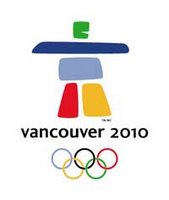I was at an interesting conference the other weekend, over on the island, on the Commons. George Caffentzis and Silvia Federici were speaking, among others, including local activists.
At the end there was a long, plenary discussion session. As always in such sessions, the talk rather went in circles, and mostly concerned what had been left out of the conference presentations, rather than the themes that they had in fact introduced. (And I was as guilty of making such points as anyone else.)
 Then my friend Fiona suggested that the issue of the commons was a good one to rally around to protest the upcoming Vancouver Winter Olympics.
Then my friend Fiona suggested that the issue of the commons was a good one to rally around to protest the upcoming Vancouver Winter Olympics. She pointed to the ways in which preparations for the Olympics involve a series of privatizations, backhanders to local developers, and attempts to "clean up" the city's Downtown Eastside (Canada's poorest postcode) by cracking down on the homeless, banishing them to the suburbs.
(It seems that the Olympics protest site, a parody of the official site, has been forced down, apart from a single page disputing the emblem chosen for Vancouver 2010. But see 2010 Olympic Games Watch, although these seem to be mainly a group of concerned NIMBY taxpayers. More along the lines of Fiona's criticisms is Naomi Klein's article, "The Olympics Land Grab". See also this environmental protest against the highway development to Whistler.)
But as I said at the time, I'd argue that the Olympics, and the hullaballoo surrounding them, manifest a rather more complex inter-relation between common, public, and private than could be summarized in a simple cry that "we are the commons, you the privatizers." I was roundly attacked for saying this at the conference, and I'm no simple-minded Olympics booster, but...
The driving ideology of the Olympic movement, after all, is of a transnational liberal universalism. And however much the Olympic organization fails to live up to their own ideals, that ideology continues to have its effects. It translates into a public service ethos that requires some attention paid to sustainability and even First Nations issues. Moreover, and more pragmatically, the Olympics are an occasion for massive public works projects, particularly improving transport infrastructure, but also housing as well as sports venues, that are on the whole arguably in the public good. Much more so, that is, than the activities of most private capitalist enterprises.
I further noted that in my own experience the various (failed) attempts by Manchester to secure the Olympic Games (though they did eventually end up holding the 2002 Commonwealth Games, as a sort of compromise) were in fact crucial to the renovation of a sense of communal and urban identity. Some of which, yes, led for instance to massive land speculation and milliion-pound flats in the city centre, while deprivation continued round the corner. But much of which was, truly, inspiring and invigorating.
 Alongside the 1996 IRA bomb, which opened up parts of the city centre that had not been public space since the middle ages, and alongside the city's cultural creativity (music, sport), Manchester's (leftist) city council's determination to host the games played its part in a post-industrial renovation and sense of civic pride which has mostly facilitated, rather than ennervating, a sense of the common.
Alongside the 1996 IRA bomb, which opened up parts of the city centre that had not been public space since the middle ages, and alongside the city's cultural creativity (music, sport), Manchester's (leftist) city council's determination to host the games played its part in a post-industrial renovation and sense of civic pride which has mostly facilitated, rather than ennervating, a sense of the common.Finally, I'd add the following: what makes the Games big business (for whatever profits local developers reap are by comparison peanuts) is that they enable global advertizers to sell global audiences via global television deals to global corporations: McDonalds, VISA, what have you.
And the interest that these global corporations have in the Games is precisely the fact that, in these days of market fragmentation and the decline of public service broadcasting, they are (like the Superbowl and the World Cup, but even more so) among the few things that many millions around the world have, well, in common. It's true that Nike et. al. are trying to convert this common affect into something that can raise a profit, but why deny that brief glimpse of affective commonality?
In other words, why not rescue something of the (perhaps utopian) commonality that still resides in the Olympics, rather than, inaccurately, damning them as simply another set of enclosures?
No comments:
Post a Comment